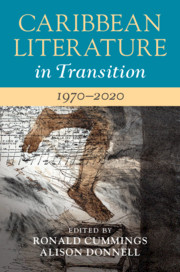Book contents
- Caribbean Literature in Transition, 1970–2020
- Caribbean Literature in Transition
- Caribbean Literature in Transition, 1970–2020
- Copyright page
- Contents
- List of Illustrations
- Contributors
- Acknowledgements
- Introduction: Caribbean Assemblages, 1970s–2020
- Part I Literary and Generic Transitions
- Chapter 1 Writing and the Responsibility to Memory: The Role of White Female Planters in Contemporary Caribbean Novels
- Chapter 2 Caribbean Identities and Diversifying the Creole Mix
- Chapter 3 Carnival, Calypso and Dancehall Cultures: Making the Popular Political in Contemporary Caribbean Writing
- Chapter 4 Life Writing, Gender and Caribbean Narrative 1970–2015: Itinerant Self-Making in the Postcolonial Caribbean
- Chapter 5 Forwarding Dubpoetry in this Generation: A Grassroots Performance and Neo-Literary Genre in Transition
- Chapter 6 Postcolonial Ruins, Reconstructive Poetics: Caribbean Urban Imaginaries
- Chapter 7 Reimagining Caribbean Time and Space: Speculative Fiction
- Chapter 8 Caribbean Drama and Performance
- Chapter 9 Here Are the Others: Caribbean Creative Nonfiction
- Chapter 10 ‘Let Every Child Run Wild’: Cultural Identity and the Role of the Child in Caribbean Children’s and Young Adult Fiction
- Part II Cultural and Political Transitions
- Part III The Caribbean Region in Transition
- Part IV Critical Transitions
- Bibliography
- Index
Chapter 9 - Here Are the Others: Caribbean Creative Nonfiction
from Part I - Literary and Generic Transitions
Published online by Cambridge University Press: 16 December 2020
- Caribbean Literature in Transition, 1970–2020
- Caribbean Literature in Transition
- Caribbean Literature in Transition, 1970–2020
- Copyright page
- Contents
- List of Illustrations
- Contributors
- Acknowledgements
- Introduction: Caribbean Assemblages, 1970s–2020
- Part I Literary and Generic Transitions
- Chapter 1 Writing and the Responsibility to Memory: The Role of White Female Planters in Contemporary Caribbean Novels
- Chapter 2 Caribbean Identities and Diversifying the Creole Mix
- Chapter 3 Carnival, Calypso and Dancehall Cultures: Making the Popular Political in Contemporary Caribbean Writing
- Chapter 4 Life Writing, Gender and Caribbean Narrative 1970–2015: Itinerant Self-Making in the Postcolonial Caribbean
- Chapter 5 Forwarding Dubpoetry in this Generation: A Grassroots Performance and Neo-Literary Genre in Transition
- Chapter 6 Postcolonial Ruins, Reconstructive Poetics: Caribbean Urban Imaginaries
- Chapter 7 Reimagining Caribbean Time and Space: Speculative Fiction
- Chapter 8 Caribbean Drama and Performance
- Chapter 9 Here Are the Others: Caribbean Creative Nonfiction
- Chapter 10 ‘Let Every Child Run Wild’: Cultural Identity and the Role of the Child in Caribbean Children’s and Young Adult Fiction
- Part II Cultural and Political Transitions
- Part III The Caribbean Region in Transition
- Part IV Critical Transitions
- Bibliography
- Index
Summary
Creative non-fiction, including modes of essay, letter and journal writing, has been an important genre in Caribbean writing. Caribbean literature has had a long history of creative/critical intersections, and many of the most significant creative figures have also been influential in setting critical agendas through these literary forms (Brathwaite, Brodber, Lamming, Walcott, Wynter). During the contemporary period, creative non-fiction has also functioned as a key site for writers to explore ideas about the changing Caribbean, in its political, social, artistic, and spiritual dimensions, and to constantly recontextualize the Caribbean’s place in the world. This essay addresses how selected Caribbean writers have participated in the genre of nonfiction from the 1970s to the present. The discussion explores the issues and problems of categories and classifications and offers close readings of non-fictional works by V. S. Naipaul, Jamaica Kincaid and Rachel Manley.
- Type
- Chapter
- Information
- Caribbean Literature in Transition, 1970–2020 , pp. 148 - 163Publisher: Cambridge University PressPrint publication year: 2021

